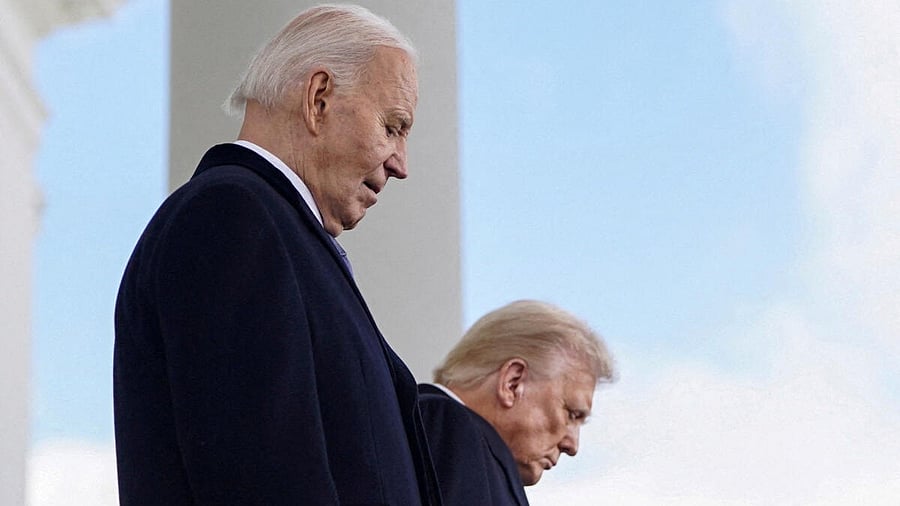
Joe Biden and Donald Trump.
Credit: Reuters photo
By Noah Feldman
The pardon power is evolving before our very eyes — and not in a good way.
First outgoing President Joe Biden pardoned government officials and family members who had committed no crimes to preclude vindictive prosecutions by incoming President Donald Trump. Then Trump, who was criminally prosecuted by the Biden administration, pardoned or commuted the sentences of 1,600 people who stormed the Capitol on Jan. 6, 2021, in an effort to overturn the results of the 2020 election.
The upshot of this extraordinary flood of pardons is that the power is becoming increasingly personalized to the president and his political allies. That development runs counter to the underlying ideal of the rule of law, which is that the law should apply equally to everyone.
To make sense of the evolving pardon power, it’s worth going back to the framing of the Constitution and the debates about the power that took place then. The framers understood that pardon power was more characteristic of a monarchy than of a republic that was supposed to be, in the words of the Massachusetts Constitution of 1780, “a government of laws and not of men.” But the tradition of royal pardons was strong, as was the roughly Christian notion that even the worst offenders deserve mercy some of the time. So, the pardon power made it into the Constitution.
During the ratification process, the only real objection to the pardon power came from ultra-republican George Mason, who at the Virginia ratifying convention argued that the president should not have the power to pardon “because he may frequently pardon crimes which were advised by himself.” At a minimum, Mason proposed, the president’s pardon power should not extend to treason.
If that sounds to you like a prophecy of Trump pardoning the people who heard him say on Jan. 6, “If you don't fight like hell you’re not going to have a country anymore,” you’re not wrong. What Mason said next will make you even more concerned: “It may happen, at some future day,” Mason intoned, that a president “will establish a monarchy, and destroy the republic. If he has the power of granting pardons before indictment, or conviction, may he not stop inquiry and prevent detection?”
By this point in the ratifying convention, Mason, who had been a delegate in Philadelphia the previous summer, had turned on the Constitution and was pretty much trying to block ratification. James Madison, the document’s principal architect, was at the Virginia ratifying convention trying to make sure that didn’t happen. He made the only possible answer to Mason, namely that a president who had a “suspicious” connection with someone he pardoned could always be impeached. Madison’s answer made sense in theory. But today, with impeachment increasingly looking like a relic of a distant past in which Americans had a sense of common decency, it’s unfortunately clear that Madison’s answer also seems irrelevant to our current conditions.
That said, at least some of the framers believed that pardons could be used to heal deep national division. In the Federalist Papers (Number 74 if you’re following in your program), Alexander Hamilton set out to defend the pardon power from Mason’s criticism. Hamilton’s fascinating and original argument was that, in the aftermath of “seditions which embrace a large proportion of the community,” the president could use pardons to calm the waters. “There are often critical moments,” he wrote, “when a well-timed offer of pardon to the insurgents or rebels may restore the tranquility of the commonwealth.”
If this also sounds like a prophecy of Jan. 6 and its aftermath, you’re not wrong this time, either. Hamilton was thinking of mass uprisings against the government, which weren’t unheard of in his day. In the Federalist, he referred specifically to Shays’ Rebellion, which took place in Western Massachusetts in 1786 when citizens tried to block the courts from ordering debt and tax collection.
Then, in 1794, when Washington was president and Hamilton secretary of the treasury, a similar uprising broke out in western Pennsylvania as a reaction to federal taxation of the lifeblood of the local economy — rye whiskey. Hamilton himself rode out at the head of an army to scare the rebels into submission. After two rebels were convicted in federal court, Washington pardoned them, acting in fulfillment of Hamilton’s advice.
The Jan. 6 attack on the Capitol arguably bears some structural resemblance to these two late 18th century rebellions. All featured populist outrage, mob behavior and some violence. All were eventually put down by a show of force.
The big difference, of course, is that the Jan. 6 attack was motivated by the desire to install Trump as president after he had lost the 2020 election. So, Trump’s act of pardon, even if it does help restore some degree of domestic tranquility, is thus also a reflection of personal self-interest. Sad to say, Biden’s pardons of his family members, including his son, Hunter, are also more personal than almost any pardons given before. Protective though they may have been, part of the reason Biden had to protect his family, not to mention the government officials who investigated the Jan. 6 riots, is that the Biden administration decided to prosecute Trump criminally.
With hindsight, we can see that prosecuting Trump contributed to the breakdown of the rule of law, even as it was certainly intended to uphold the rule of law. Now we have lots of pardons on both sides — exercises of the monarchic or imperial impulse that the framers feared above all else.